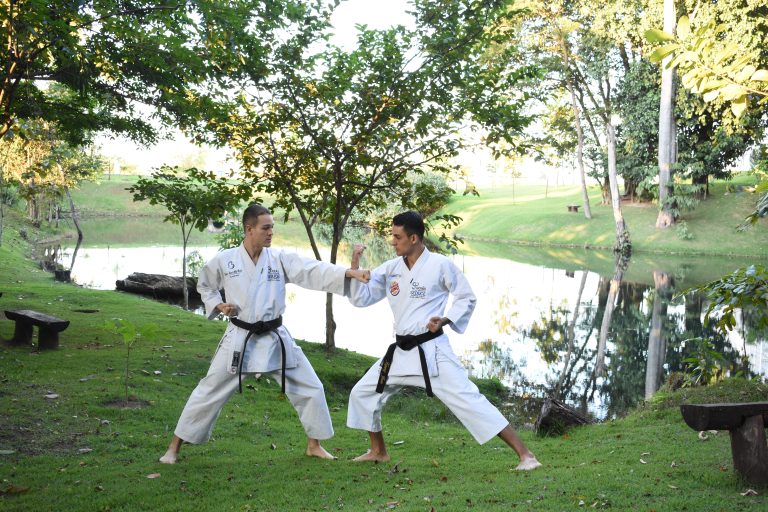Is Shotokan Karate Effective? Debunking Common Misconceptions
Shotokan Karate is a martial arts style that was created by Gichin Funakoshi, a Japanese martial artist, in the 1930s. The style emphasizes powerful, linear techniques, and is known for its deep stances and strong punches. Shotokan Karate is one of the most popular martial arts styles in the world, but some people question its effectiveness as a self-defense system. In this blog post, we’ll explore the question of whether Shotokan Karate is effective, and debunk some common misconceptions about the style.
What are the Benefits of Shotokan Karate?
Before we dive into whether Shotokan Karate is effective or not, it’s important to understand the benefits of practicing this martial art. Shotokan Karate offers a wide range of physical and mental benefits, such as improved fitness, flexibility, and strength, increased confidence and self-esteem, and enhanced discipline and focus.
In addition to these general benefits, Shotokan Karate is also known for its practical applications in self-defense. The style emphasizes using powerful strikes to incapacitate an attacker quickly and efficiently, as well as grappling and throwing techniques. Shotokan Karate practitioners are trained to defend themselves in a variety of scenarios, including both standing and ground-based attacks.
Debunking Common Misconceptions About Shotokan Karate
Now that we’ve established some of the benefits of Shotokan Karate, let’s address some of the most common misconceptions about the style.
Misconception #1: Shotokan Karate is Too Traditional
One of the most common criticisms of Shotokan Karate is that it is too reliant on tradition, and doesn’t reflect modern self-defense needs. While it’s true that Shotokan Karate has a long history and incorporates many traditional techniques, the style is also constantly evolving to meet modern challenges.
Today’s Shotokan Karate practitioners train in a variety of self-defense scenarios, including fighting against multiple attackers, dealing with weapons, and protecting against grabs and holds. The style also emphasizes situational awareness and avoidance, helping students to identify potential threats before they escalate into physical confrontations.
Misconception #2: Shotokan Karate is Only Useful for Sport Martial Arts
Another common misconception about Shotokan Karate is that it is primarily a sport martial art, and doesn’t have practical application in real-world self-defense situations. While it’s true that Shotokan Karate has a strong presence in sport karate competitions, the style’s techniques can be highly effective in self-defense scenarios as well.
In fact, many Shotokan Karate practitioners are highly skilled at applying the style’s techniques in real-world situations. By focusing on powerful strikes and practical self-defense techniques, Shotokan Karate students are well-prepared to defend themselves in a variety of scenarios.
Misconception #3: Shotokan Karate is Too Rigid
One final misconception about Shotokan Karate is that it is too rigid and doesn’t allow for creativity or adaptability. While it’s true that Shotokan Karate emphasizes specific moves and techniques, practitioners are also encouraged to adapt these techniques to different situations.
In addition, many Shotokan Karate teachers incorporate other martial arts styles into their training, allowing students to develop a more well-rounded set of skills. By incorporating grappling and throwing techniques, as well as strikes from other martial arts styles, Shotokan Karate practitioners can become highly adaptable and effective fighters.
Introduction
Shotokan Karate is a martial art that was developed in Japan in the early 20th century. It is known for its powerful strikes and dynamic kicks, making it a popular style for self-defense and sport. Over the years, there has been much debate about the effectiveness of Shotokan Karate in real-world situations. In this article, we will address some of the most frequently asked questions about the effectiveness of Shotokan Karate.
Question 1: Is Shotokan Karate Effective in Self-Defense Situations?
There is no doubt that Shotokan Karate can be effective in self-defense situations. Students who train in this style learn a variety of techniques that can be used to defend themselves in real-world situations. These techniques include strikes, kicks, blocks, and throws.
One of the key benefits of training in Shotokan Karate is developing the ability to react quickly in self-defense situations. Sparring and partner drills allow students to practice these skills in a controlled environment, which translates well to real-life situations where split-second decisions can make all the difference.
It is important to note that no martial art is 100% effective in all situations. Every situation is different, and the effectiveness of any technique will depend on a variety of factors, including the skill level of the practitioner, the size and strength of the opponent, and the nature of the situation.
Question 2: Can Shotokan Karate Be Used for Sport?
Absolutely! Shotokan Karate is a popular style in martial arts competitions around the world. Competitions can include both sparring and kata (a defined sequence of techniques), allowing practitioners to showcase their skills in a variety of ways.
Participating in martial arts competitions can be a great way to improve one’s skills, as it provides an opportunity to compete against other practitioners and receive feedback from judges. It can also be a great way to build self-confidence and discipline.
Question 3: Is Shotokan Karate Practical for Real-World Fighting Situations?
Shotokan Karate can be practical for real-world fighting situations, but it is important to understand that the techniques used in competition may not always translate directly to self-defense situations.
In competition, practitioners are restricted by rules and regulations that define what techniques are legal and how they can be used. In self-defense situations, there are no such restrictions, so practitioners must be able to adapt their techniques to the situation at hand.
Additionally, practitioners must also be aware of the legal and ethical considerations that come with using physical force to defend oneself. It is always important to strive for nonviolent conflict resolution whenever possible.
Question 4: Can Shotokan Karate Improve Fitness and Overall Health?
Yes, training in Shotokan Karate can provide many health benefits. Shotokan Karate is a physically demanding martial art that can help improve cardiovascular health, build strength and endurance, and increase flexibility.
In addition to the physical benefits, training in Shotokan Karate can also provide mental and emotional benefits. It can help build self-confidence, discipline, and focus, which can be carried over to all areas of life.
How to Evaluate the Effectiveness of Shotokan Karate
Shotokan karate is a popular martial art that dates back to the early 20th century. Developed by Gichin Funakoshi, it emphasizes strong technique, discipline, and physical fitness. However, with so many martial arts styles out there, it can be challenging to determine if Shotokan karate is the right one for you. In this guide, we’ll take a look at how you can evaluate the effectiveness of Shotokan karate.
1. Research the History and Philosophy of Shotokan Karate
Before you start practicing Shotokan karate, it’s important to understand its roots and philosophy. This martial art is based on the idea of training both the body and the mind to become a better person. Its core values include humility, respect, and self-control. Understanding the philosophy behind this martial art can help you
Inhaltsverzeichnis





